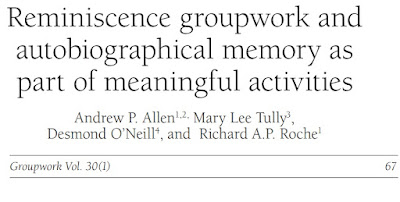There has been some research interest over the last few years in the effect of reminiscence and its effect on autobiographical memory performance, perhaps particularly in people with impairment in autobiographical memory. In the pre-COVID "before times", I was involved in a project with a service provider that organises various activities for residents and people from the local community.
We ran reminiscence sessions that covered subjects drawing on personal autobiography as well as some broader social/political events in Irish history (all participants were Irish). There was a comparison condition where we ran sessions with similar topics, but with a focus on the present (e.g. covering lifelong learning/learning new things, whereas the equivalent reminiscence session was about schooldays). We offered both groups to all participants, assessing their autobiographical memory retrieval at baseline and after both of the groups.
Although I was going in with the idea of running the groups specifically with people with memory impairment, the meaningful activities manager suggested it would work better with a more mixed group. The inclusion of people with no cognitive impairment and those with dementia in the same group might have seemed daunting at first glance, but actually worked well, as participants could remind each other of memories at a more personalised/localised level than I would have been able to. The group had 6-8 people in general, but we were able to break into smaller groups of 2 or 3 so that people had more scope for taking turns in discussing their memories.
When assessed using a structured interview, autobiographical memory retrieval didn't seem to be substantially affected (I should say it was a small sample). However, the meaningful activities manager indicated that the people who took part in the groups and their families reported a greater engagement with reminiscence during their daily lives. There's a general lesson in there about how, although cognitive assessments at a given point in time can be controlled and tight, they may struggle to capture cognition "in the wild".
It's great to see a manuscript based on this project published in Groupwork, whose special issue on groupwork and research prompted us to think about some of the processes of this work in greater depth. I must acknowledge as well that the project wouldn't have been possible without the help of the staff at the service provider.
Allen, A., Tully, M. L.,
O’Neill, D., & Roche, R. A. (2021). Reminiscence groupwork and
autobiographical memory as part of meaningful activities. Groupwork, 30(1). https://doi.org/10.1921/gpwk.v30i1.1548
Related posts
If you like this post, follow me on Twitter: @ArchivePsych

No comments:
Post a Comment